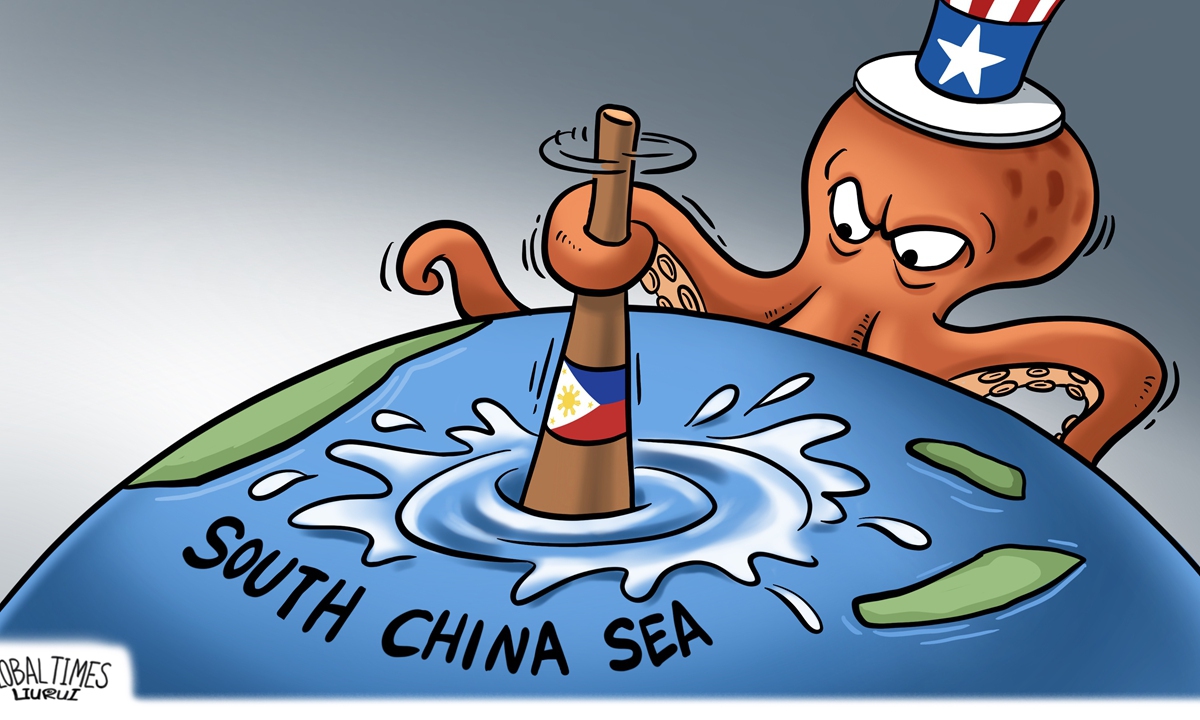
US in South China Sea Illustration:Liu Rui/GT
China strongly opposes the US deploying medium-range ballistic missiles in the Asia-Pacific and strengthening forward deployment at China's doorstep to seek unilateral military advantage, the Chinese Foreign Ministry said in response to US Army Pacific's announcement of its successful deployment of a new capability for the first time, a move believed by some to help bolster deterrence against China.
The US Army Pacific announced on Monday local time on its website that it has deployed its new Mid-Range Capability missile system, also known as the Typhon Weapons System, to Northern Luzon, the Philippines, as part of the annual bilateral exercises between the Philippine Army and the US Army Pacific, dubbed Salaknib, which began on April 8.
Such a move would be the first US deployment of a ground-based launcher since it withdrew in 2019 from the 1987 Intermediate-Range Nuclear Forces Treaty (INF) between the US and then-Soviet Union that banned all land-based missiles, conventional and nuclear, that could travel between 500 kilometers and 5,500 kilometers, according to media report.
Some commentators have said that the move could help bolster deterrence against China.
In response, Chinese Foreign Ministry spokesperson Lin Jian said during a Thursday briefing that China noted the announcement and expresses grave concern over the move.
China strongly opposes the US deploying medium-range ballistic missiles in the Asia-Pacific and strengthening forward deployment at China's doorstep to seek unilateral military advantage, Lin said, noting the US' move exacerbates tensions in the region and increases the risk of misjudgment and miscalculation.
We urge the US to earnestly respect other countries' security concerns, stop stoking military confrontation, stop undermining peace and stability in the region, and take concrete actions to reduce strategic risks, Lin said.
The Philippines needs to see and be mindful of what the US is truly after and the consequence of going along with the US on deploying medium-range ballistic missiles. The Philippines needs to think twice about being a cat's paw for the US at the expense of its own security interests, and stop sliding down the wrong path, Lin added.
According to the Naval News, the new capability is being deployed for the first time in the First Island Chain for joint military exercises in the northern Philippines. Typhon's missiles can cover not only the entire Luzon Strait but also reach the Chinese coast and various People's Liberation Army bases in the South China Sea.
The US Army said last year that it had conducted a number of successful tests of the system, which has four trailer-based launchers and other supporting equipment, along with Tomahawk and SM-6 missiles.
Some observers said that the US' deployment of the Typhon system in the Philippines will severely disrupt freedom of navigation in the South China Sea, since this missile system is an offensive military platform. They added that the provocative intent of the US, as an external power, is very clear, and obviously aimed at China. It is an attempt to disrupt the peace and stability of the South China Sea by exacerbating tensions in the region, and seeks to give the US a greater military presence in the region.
Other observers said that this missile system is more about the US exerting more military influence on the Philippines by turning the country into a veritable military base and further hijacking it, and the move will also inevitably trigger an arms race in the region.
However, it is worth noting that such outdated missile system will only pose a limited threat to China, and its political significance outweighs its military value.
Senior Colonel Wu Qian, a spokesperson for China's Ministry of National Defense, also said on April 12 that the US push to deploy mid-range missiles in the Asia-Pacific region is a dangerous move that will seriously threaten the security of regional countries and disrupt regional peace and stability. China firmly opposes it and will resolutely take countermeasures, he added.
"We urge the US to earnestly respect the security concerns of other countries and to stop undermining regional peace and stability," Wu said.




